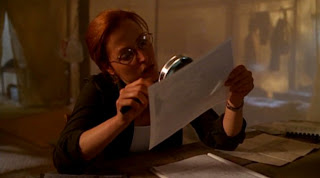You would be hard pressed to find anyone who hasn’t had at least one movie wrecked by a careless relative, friend, or acquaintance casually mentioning crucial plot points, revealing an ambiguous character’s true allegiance, or simply screaming “it’s
him, dressed up as Mother!” These thoughtless utterances, known to a small handful of Hollywood elite by the obscure industry term “spoilers,” can turn an otherwise pleasant theatrical experience into a dull and disappointing evening of knowing exactly what’s going to happen well in advance.
1
The American public has long looked for a way to deter these simpleminded but frustrating folks from clumsily ruining every movie they see.
2 Unfortunately, properly identifying dopes often requires repeated exposure, so it’s rarely possible to spot them at first glance and simply deny them the right to enter your theater or living room. And beating them to the punch—blurting out crucial information to ruin the movie
for them, before they can ruin it for you—usually causes more problems than it solves: while they may eventually learn their lesson about the perils of being stupid, mend their ways, and keep quiet until the movie’s over, you run the terrible risk of being labeled a dope yourself and then being taught
the same lesson by another grumpy moviegoer, thus continuing the cycle of stupidity.
The solution, as discovered by Nobel Prize winner Konstantin Novoselov, is to craft spoilers that are specifically designed to ruin movies for idiots, but leave them unscathed and enjoyable for your more astute fellow patrons. Sort of like a neutron bomb, except instead of killing millions of people but leaving buildings intact, it ruins movies for certain people but makes them far more enjoyable for everyone else.
3
The selection below, while far from comprehensive, should be enough to get you off to a good start of identifying dopes and improving your movie-watching experience.
WARNING: if reading any of the below causes you to react with frustration and decide that a certain movie isn’t worth watching anymore, then you’re doing it just right, dummy. Please keep reading.
Harry Potter and the Sorcerer’s Stone (2001):
The kid living under the stairs is magic.
Star Wars (1977): Han Solo shoots first.
Spartacus (1960): One of those guys really is Spartacus.
The Sixth Sense (1999): Incredibly, Bruce Willis’s character
turns out to be a child psychologist.
Fight Club (1999): There’s fighting.
Lethal Weapon (1987): Mel Gibson’s character is crazy,
but he’s a good guy underneath.
Conspiracy Theory (1997): Hang on—maybe this is the movie where
Mel Gibson’s character is crazy, but a good guy underneath.
The Beaver (2011): Unless it’s this one.
Hamlet (1990): Mel Gibson’s character merely pretends to be crazy
to cover up the fact that he’s seeing ghosts, and they tell him
to kill people. Remember, he’s pretending to be crazy.
What Women Want (2000): Mel Gibson’s character may look
crazy, but he’s not. He just thinks like a woman—which, as any married man
will tell you with his wife in the room, is not crazy at all. Or is, at least, no more
crazy than taking career advice from dead medieval Danish kings.
The Usual Suspects (1995): Keyser Soze exists, or maybe he doesn’t.
If he does exist, whoever he is, he’s a criminal genius—which
means it’s safe to conclude that he’s not Stephen Baldwin.
NOTE
1. This sensation will be familiar to anybody unfortunate enough to have tried to watch more than one episode of, among countless other examples, “The Jerry Springer Show.” Guess what? They’re going to use bad grammar, and then throw punches.
2. This, of course, does not include movies that were already ruined long before they reached the viewing public. We’re looking at you here, Watchmen.
3. In some small ways, then, it’s even better than a neutron bomb.












































